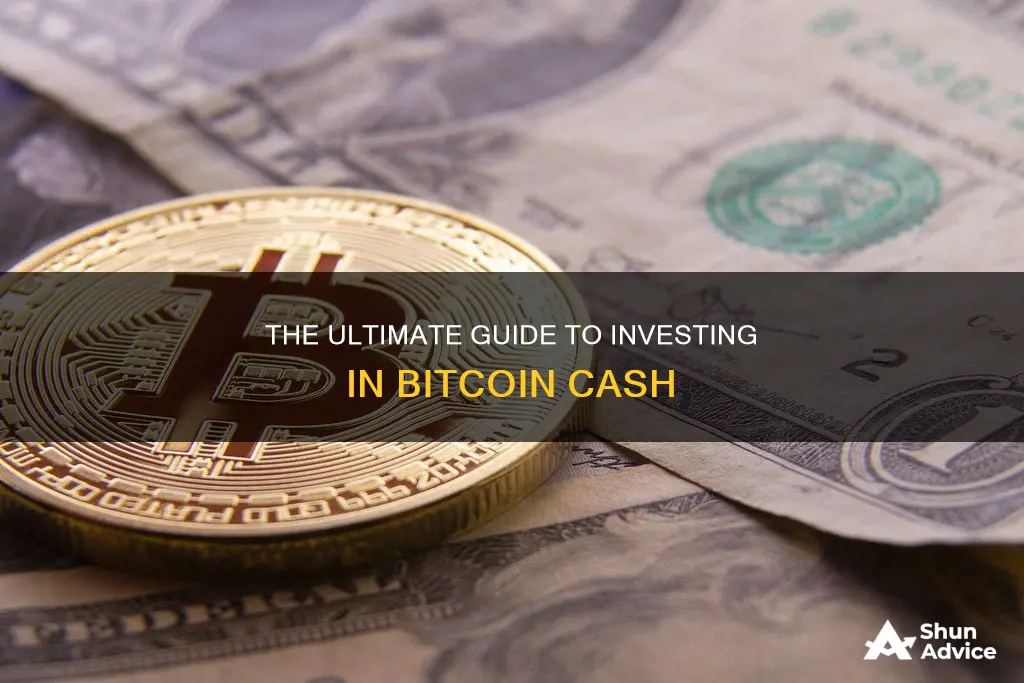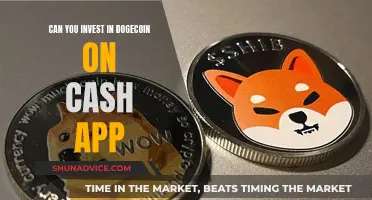
Bitcoin Cash (BCH) is a cryptocurrency that was created as a consequence of a Bitcoin hard fork in 2017. It was designed to be the digital equivalent of cash, while Bitcoin is more of a store of value, like digital gold. Bitcoin Cash is faster and cheaper than Bitcoin, making it popular with new crypto investors looking for an affordable alternative.
There are several ways to buy Bitcoin Cash. You can purchase it directly from another individual in person or over the web, or from a cryptocurrency exchange such as Coinbase, Kraken, or CEX.IO. You can also try to locate a crypto ATM near you that offers BCH, but ATM rates can be very high.
Before buying Bitcoin Cash, you will need to procure a cryptocurrency wallet that supports BCH storage. This could be a software wallet, hardware wallet, paper wallet, mobile wallet, or a wallet provided by a cryptocurrency exchange.
| Characteristics | Values |
|---|---|
| Launch Date | 1 August 2017 |
| Cryptocurrency Type | Peer-to-peer electronic cash system |
| Block Size | 32MB |
| Transactions Per Second | 116 |
| Transaction Fees | Less than $0.01 |
| Purchase Options | Credit card, bank account, payment app, cash, debit card, PayPal, gift card, wire transfer |
| Purchase Platforms | Coinbase, Kraken, CEX.IO, Bitcoin.com, Robinhood Markets, stock brokerages, crypto ATMs |
What You'll Learn

Using a credit card, bank account, or payment app
To get started investing in Bitcoin Cash, you'll first need to download a crypto wallet that supports it. In this case, you can use the Bitcoin.com Wallet mobile app. Once you've downloaded the app, you'll need to register and verify your identity. This process is made easy by the app.
After registration, you can start the process of buying Bitcoin Cash. You can pay with a credit card, bank account, or payment app. The minimum amount to buy is $30, and your funds are protected by leading crypto payment processors.
If you're using a credit card, you can pay directly in the app. The same goes for payment apps. If you're using a bank account, you'll likely have to do a bank transfer. After you've paid, you'll receive the Bitcoin Cash in your wallet in just a few minutes.
From there, you can spend, trade, or hold your Bitcoin Cash. You can monitor the status of your order online until it lands in your wallet.
JPMorgan's Bitcoin Investment: Exploring the Giant's Crypto Move
You may want to see also

Crypto exchanges
Some of the most well-known crypto exchanges are Coinbase, Gemini, Binance, Kraken, Crypto.com, Robinhood, Webull, TradeStation, and Fidelity. While these exchanges' standard trading interfaces may overwhelm beginners, they also offer user-friendly easy purchase options. However, the convenience of these options comes at a cost, as they charge substantially more than what it would cost to buy the same crypto via each platform's standard trading interface.
When choosing a crypto exchange, you may want to consider factors such as security, fees, trading volume, minimum investment requirements, and the types of cryptocurrency available for purchase.
It is also important to note that some exchanges only allow you to buy crypto using another crypto. This means you would have to find another exchange to buy the tokens your preferred exchange accepts before you could start trading crypto on that platform.
Additionally, crypto exchanges are vulnerable to theft or hacking, so it is crucial to take extra steps to secure your investments, such as enabling two-factor authentication.
Bitcoin: Worth the Investment Risk?
You may want to see also

Crypto ATMs
Using a Crypto ATM is a straightforward process. First, you will need a Bitcoin wallet to store your Bitcoin Cash. You can create one by installing an app, such as the Bitcoin.com Wallet app, on your mobile device or computer. Once you have a wallet, you can locate a Crypto ATM near you using an online map.
At the Crypto ATM, you will typically follow these steps:
- Enter the amount you want to purchase. Depending on local regulations and the amount, you may need to verify your identity.
- Provide your Bitcoin wallet address by scanning the QR code of your wallet address using the ATM's camera.
- Make your payment. In addition to cash, some Crypto ATMs may also accept credit cards or other payment methods.
- Receive the Bitcoin Cash in your wallet. This usually takes a few minutes, and the ATM will provide you with a transaction ID to track your purchase.
It is important to note that Crypto ATM rates can be high, and there is no guarantee that a specific ATM will offer Bitcoin Cash. Additionally, some Crypto ATMs may only support buying cryptocurrencies, while others may also allow you to sell and receive cash.
Calculating Bitcoin ROI: A Step-by-Step Guide
You may want to see also

Peer-to-peer trading
Peer-to-peer (P2P) trading is the direct buying and selling of cryptocurrencies among users without intermediaries. P2P exchanges connect buyers and sellers and provide a layer of protection through escrow services, feedback and rating systems, and dispute resolution.
The advantages of P2P trading include global accessibility, multiple payment options, zero transaction fees, and personalized offers. However, it also has drawbacks, such as slower trading speeds and lower liquidity than centralized exchanges (CEXs).
P2P cryptocurrency trading is a method of buying and selling cryptocurrencies directly between users without the need for a central intermediary. Users can use a P2P exchange to access a global marketplace, multiple payment options, and personalized offers.
A P2P exchange connects buyers and sellers, much like Facebook Marketplace. However, P2P exchanges also provide a layer of protection by securing transactions and reducing the risk of fraud through feedback and rating systems.
In addition, the P2P exchange uses escrow to secure the crypto being bought and sold until both parties have confirmed the transaction. For example, if you are selling bitcoins for fiat money, the P2P exchange will escrow your BTC. Once you receive the fiat money, you can confirm the transaction and the BTC will be released to the buyer's wallet.
Advantages of P2P trading
One advantage of using a local P2P Bitcoin exchange is that it gives you access to a global market of cryptocurrency buyers and sellers. For example, some P2P exchanges are accessible in hundreds of countries, allowing you to buy and sell cryptocurrencies with people around the world in a matter of minutes.
P2P exchanges offer multiple payment methods, including in-person cash payments. This can be useful for those who prefer face-to-face transactions or those without access to a bank account.
While some cryptocurrency exchanges charge a fixed fee or percentage per trade, others allow traders to connect and conduct transactions for free — be sure to check the terms and conditions before deciding on a P2P exchange.
As mentioned above, some cryptocurrency exchanges use escrow services to protect both buyers and sellers. When choosing to secure a transaction with escrow, funds are held by the exchange and released only when the terms of the transaction are met by both parties.
Transactions must be completed within a certain time frame; if a buyer doesn't make the fiat payment within the specified time, their order is canceled and the cryptocurrency is returned to the seller's wallet.
Sellers and buyers have control over the selling/buying price, exchange rate, payment method, and how much they are willing to sell/buy per transaction. As long as both parties’ terms align, a deal can be struck.
Disadvantages of P2P trading
While a P2P transaction can be conducted almost instantly once both parties have confirmed the transaction, one party might delay the transaction for various reasons. With traditional trading, you don't have to wait for the buyer or seller to confirm the transaction before you can move on.
P2P exchanges naturally have lower liquidity than CEXs due to the nature of the process. For this reason, larger traders who need to complete major transactions may prefer to use over-the-counter (OTC) trades or buy/sell via the standard exchange.
Risks of P2P trading
P2P trading is generally safe, but this usually depends on the exchange and the safety measures it has in place. While older P2P exchanges came with a higher risk of theft and scams, many newer P2P trading platforms have greatly improved their security measures.
A leading P2P exchange today will have an escrow service, regular security updates, and a stringent identity verification process (among other measures) to keep users safe. However, even with robust safeguards in place, all trading activity comes with risks — and P2P trading is no exception.
Coinbase Alternatives: Exploring Crypto Investment Platforms
You may want to see also

Non-custodial wallets
There are several trusted non-custodial wallet providers, including:
- MetaMask: Accessed via a mobile app and browser extension, with over 30 million users. It provides users with an encrypted private key through a simple 12-word passphrase.
- Trust Wallet: Supports over 70 blockchains and more than 4.5 million digital assets, including Bitcoin, XRP, Solana, Cardano, and Ethereum. It is available as an iOS and Android app, as well as a Chrome browser extension.
- Electrum: A desktop wallet that supports Bitcoin, with multi-sig permissions and the option to keep private keys offline.
- Trezor: A hardware device that keeps crypto tokens and private keys offline. It supports over 1,000 cryptocurrencies, including Bitcoin, Ethereum, and XRP.
- BitAddress: A free paper wallet for storing Bitcoin offline.
- Coinbase Wallet: A non-custodial wallet app that does not have access to the user's private keys. It supports dozens of blockchain networks and can connect to dApps.
- Coinomi: Supports 125 blockchains and can be downloaded as an Android or iOS app, as well as desktop software for Windows and Mac. It offers cold staking to earn income without exposing private keys to live servers.
- OKX: An all-in-one ecosystem supporting multiple blockchains, including Ethereum, Polygon, and Binance Smart Chain. It is a great option for earning interest on idle crypto tokens.
- Exodus: A user-friendly non-custodial wallet with a dashboard that provides real-time pricing in the user's preferred currency. It supports over 260 cryptocurrencies and NFTs and can be accessed via an app or desktop software, as well as a Chrome browser extension.
- MyEtherWallet: A free mobile wallet app for iOS and Android, supporting all ERC20 tokens and NFTs on the ERC721 standard.
When choosing a non-custodial wallet, it is important to consider the features that are most important to you, such as the number of supported coins, staking opportunities, security features, and user-friendliness.
Holly Willoughby's Bitcoin Investment: Fact or Fiction?
You may want to see also
Frequently asked questions
Bitcoin Cash (BCH) is a cryptocurrency that was created as a consequence of a Bitcoin hard fork in August 2017. It has cheaper and faster transactions than Bitcoin.
You can buy Bitcoin Cash on a cryptocurrency exchange like Coinbase, Kraken, CEX.IO, or Bitcoin.com. You can also buy it on stock brokerages or payment apps such as PayPal.
First, you need to create an account on a platform that supports Bitcoin Cash. Then, you need to verify your identity and add a payment method. Finally, you can place an order to buy Bitcoin Cash.
Bitcoin Cash has lower transaction fees and faster transaction speeds than Bitcoin. It also has a highly scarce supply of 21 million coins, which may increase its value in the future.







